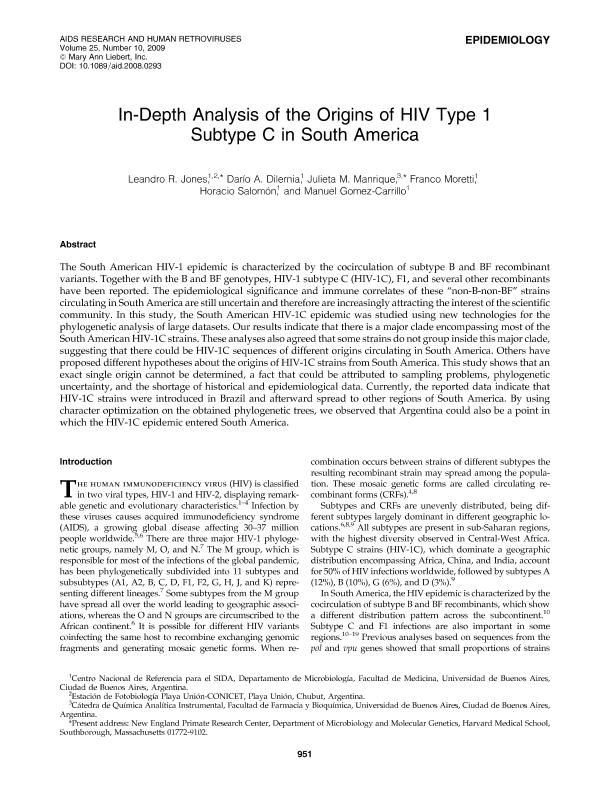Mostrar el registro sencillo del ítem
dc.contributor.author
Jones, Leandro Roberto

dc.contributor.author
Dilernia, Darío Alberto

dc.contributor.author
Manrique, Julieta Marina

dc.contributor.author
Moretti, Franco

dc.contributor.author
Salomon, Horacio Eduardo

dc.contributor.author
Gómez Carrillo, Manuel

dc.date.available
2020-03-12T20:46:59Z
dc.date.issued
2009-10
dc.identifier.citation
Jones, Leandro Roberto; Dilernia, Darío Alberto; Manrique, Julieta Marina; Moretti, Franco; Salomon, Horacio Eduardo; et al.; In-depth analysis of the origins of HIV type 1 subtype C in South America; Mary Ann Liebert; Aids Research and Human Retroviruses; 25; 10; 10-2009; 951-959
dc.identifier.issn
0889-2229
dc.identifier.uri
http://hdl.handle.net/11336/99389
dc.description.abstract
The South American HIV-1 epidemic is characterized by the cocirculation of subtype B and BF recombinant variants. Together with the B and BF genotypes, HIV-1 subtype C (HIV-1C), F1, and several other recombinants have been reported. The epidemiological significance and immune correlates of these "non-B-non-BF" strains circulating in South America are still uncertain and therefore are increasingly attracting the interest of the scientific community. In this study, the South American HIV-1C epidemic was studied using new technologies for the phylogenetic analysis of large datasets. Our results indicate that there is a major clade encompassing most of the South American HIV-1C strains. These analyses also agreed that some strains do not group inside this major clade, suggesting that there could be HIV-1C sequences of different origins circulating in South America. Others have proposed different hypotheses about the origins of HIV-1C strains from South America. This study shows that an exact single origin cannot be determined, a fact that could be attributed to sampling problems, phylogenetic uncertainty, and the shortage of historical and epidemiological data. Currently, the reported data indicate that HIV-1C strains were introduced in Brazil and afterward spread to other regions of South America. By using character optimization on the obtained phylogenetic trees, we observed that Argentina could also be a point in which the HIV-1C epidemic entered South America.
dc.format
application/pdf
dc.language.iso
eng
dc.publisher
Mary Ann Liebert

dc.rights
info:eu-repo/semantics/openAccess
dc.rights.uri
https://creativecommons.org/licenses/by-nc-sa/2.5/ar/
dc.subject
HIV
dc.subject
Subtype C Epidemic
dc.subject
Origin
dc.subject
South America
dc.subject.classification
Ciencias de las Plantas, Botánica

dc.subject.classification
Ciencias Biológicas

dc.subject.classification
CIENCIAS NATURALES Y EXACTAS

dc.title
In-depth analysis of the origins of HIV type 1 subtype C in South America
dc.type
info:eu-repo/semantics/article
dc.type
info:ar-repo/semantics/artículo
dc.type
info:eu-repo/semantics/publishedVersion
dc.date.updated
2019-11-25T18:01:46Z
dc.journal.volume
25
dc.journal.number
10
dc.journal.pagination
951-959
dc.journal.pais
Estados Unidos

dc.description.fil
Fil: Jones, Leandro Roberto. Universidad de Buenos Aires. Facultad de Medicina. Departamento de Microbiología. Centro Nacional de Referencia para el Sida; Argentina. Fundación Playa Unión. Estación de Fotobiología Playa Unión; Argentina. Consejo Nacional de Investigaciones Científicas y Técnicas; Argentina
dc.description.fil
Fil: Dilernia, Darío Alberto. Consejo Nacional de Investigaciones Científicas y Técnicas; Argentina. Universidad de Buenos Aires. Facultad de Medicina. Departamento de Microbiología. Centro Nacional de Referencia para el Sida; Argentina
dc.description.fil
Fil: Manrique, Julieta Marina. Universidad de Buenos Aires. Facultad de Farmacia y Bioquímica. Departamento de Química Analítica y Fisicoquímica. Cátedra de Química Analítica Instrumental; Argentina. Consejo Nacional de Investigaciones Científicas y Técnicas; Argentina
dc.description.fil
Fil: Moretti, Franco. Universidad de Buenos Aires. Facultad de Medicina. Departamento de Microbiología. Centro Nacional de Referencia para el Sida; Argentina
dc.description.fil
Fil: Salomon, Horacio Eduardo. Universidad de Buenos Aires. Facultad de Medicina. Departamento de Microbiología. Centro Nacional de Referencia para el Sida; Argentina. Consejo Nacional de Investigaciones Científicas y Técnicas; Argentina
dc.description.fil
Fil: Gómez Carrillo, Manuel. Universidad de Buenos Aires. Facultad de Medicina. Departamento de Microbiología. Centro Nacional de Referencia para el Sida; Argentina. Consejo Nacional de Investigaciones Científicas y Técnicas; Argentina
dc.journal.title
Aids Research and Human Retroviruses

dc.relation.alternativeid
info:eu-repo/semantics/altIdentifier/doi/https://doi.org/10.1089/aid.2008.0293
dc.relation.alternativeid
info:eu-repo/semantics/altIdentifier/url/https://www.liebertpub.com/doi/10.1089/aid.2008.0293
Archivos asociados
